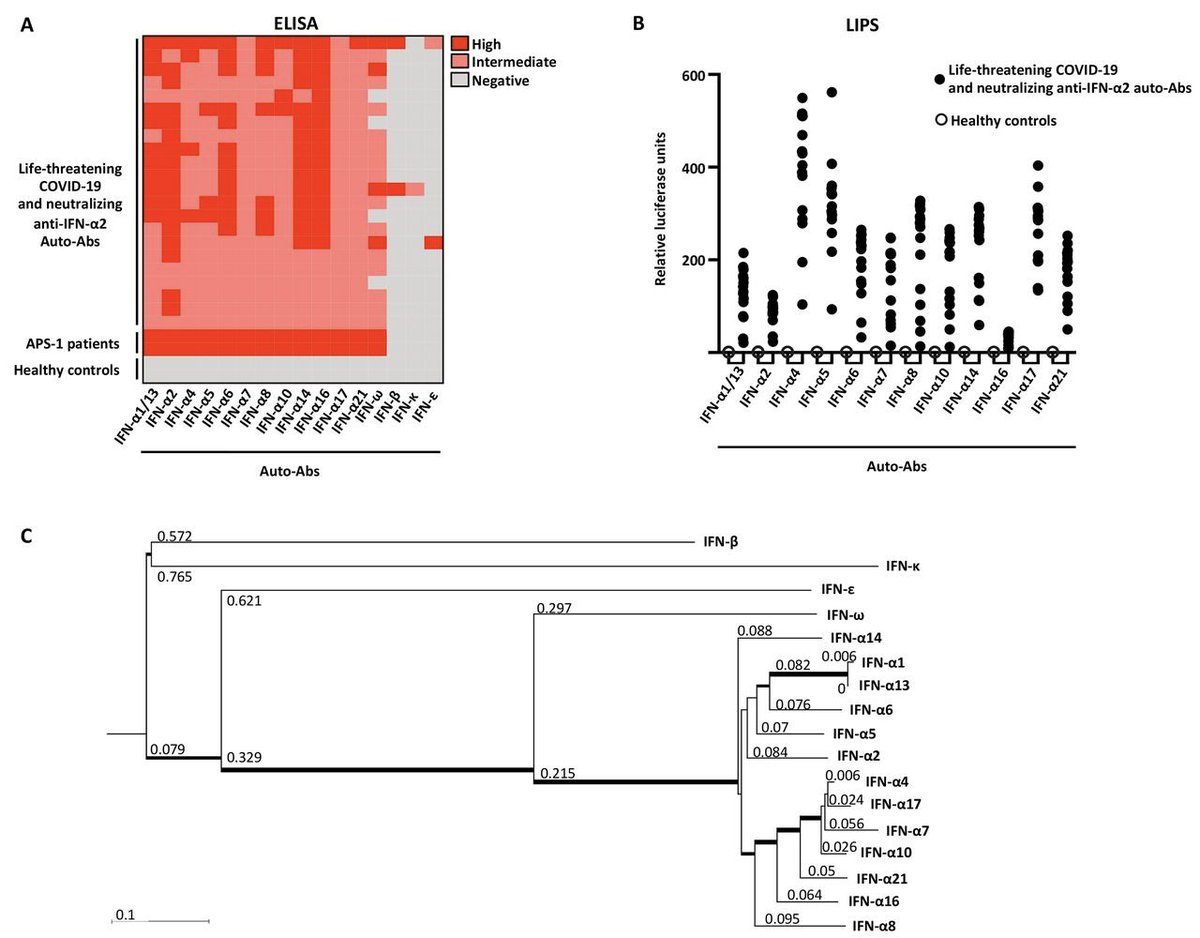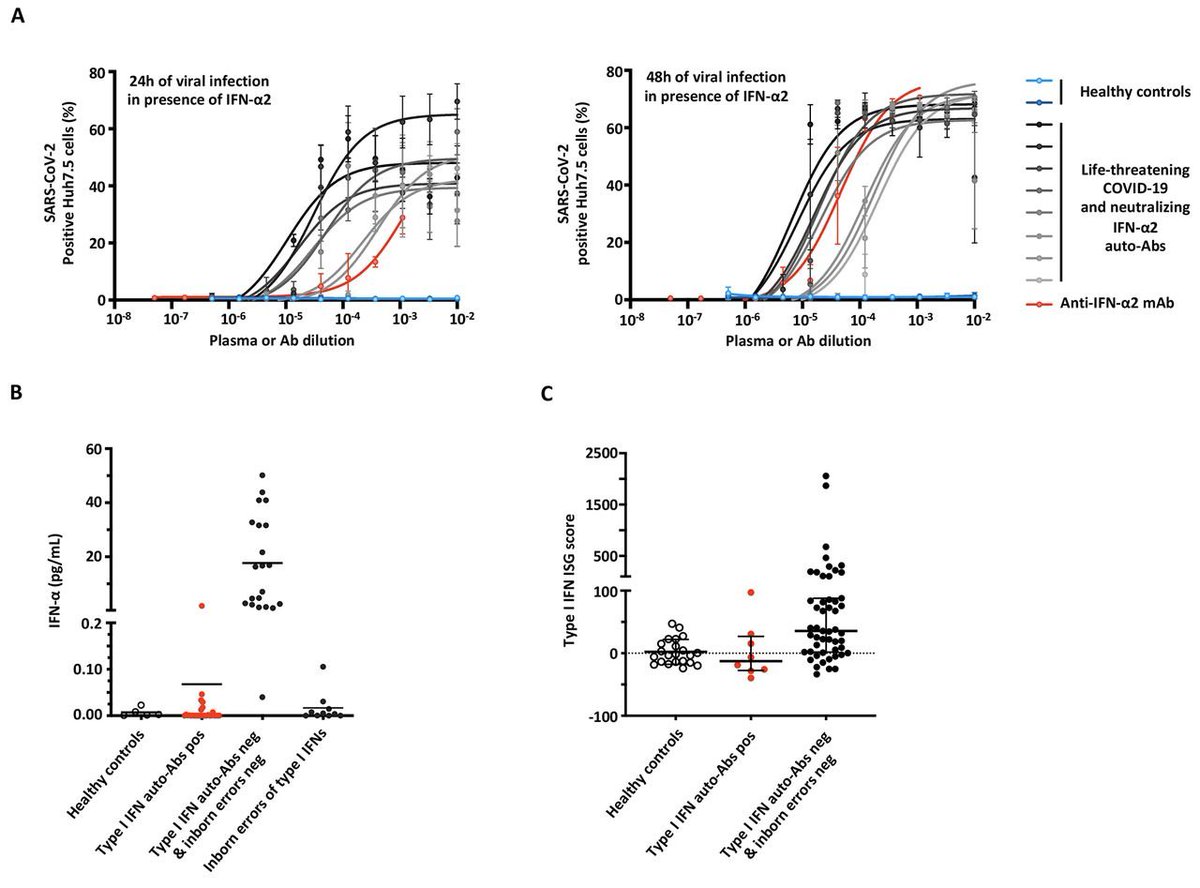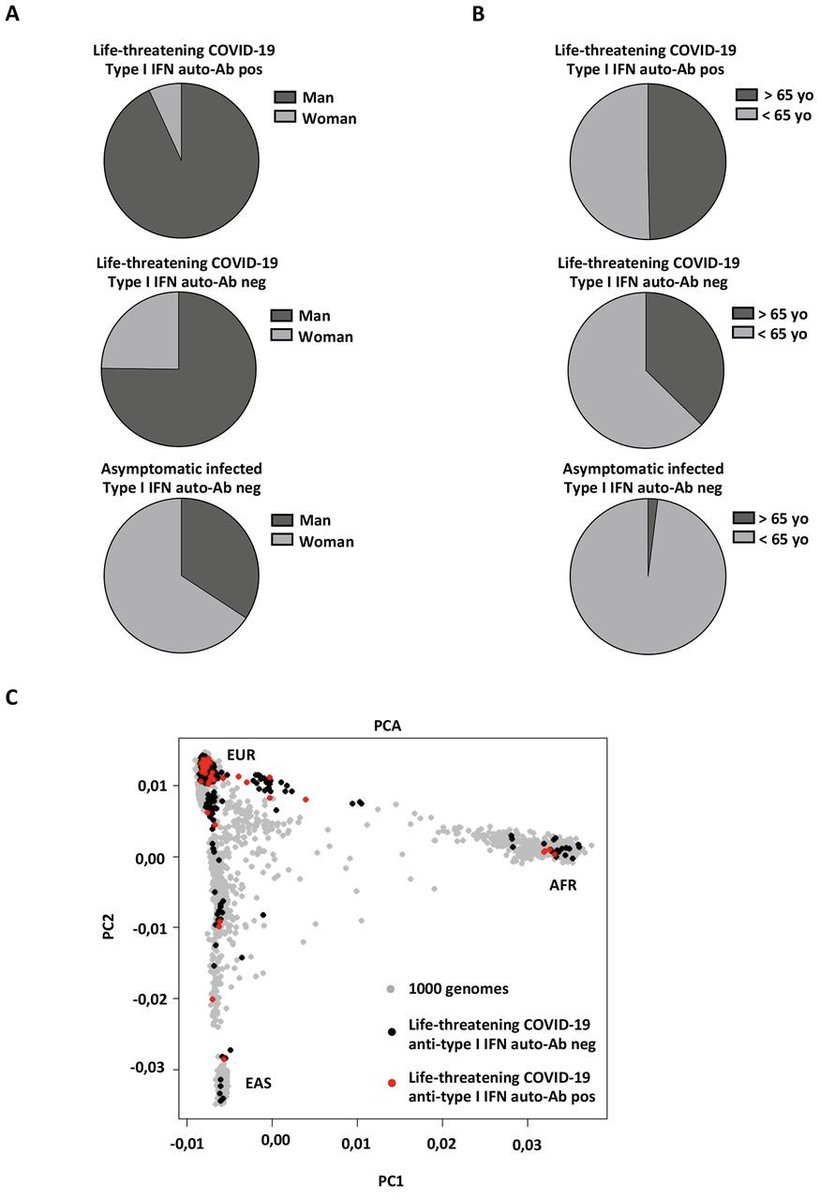Check out this very cool study from @casanova_lab hot off the press at @ScienceMagazine.
It shows that very severe #COVID19 is associated with auto-antibodies against type I interferons. https://science.sciencemag.org/content/early/2020/09/23/science.abd4585">https://science.sciencemag.org/content/e...
It shows that very severe #COVID19 is associated with auto-antibodies against type I interferons. https://science.sciencemag.org/content/early/2020/09/23/science.abd4585">https://science.sciencemag.org/content/e...
Type I interferons (IFNs) are central to our cells& #39; innate defenses against viral infection. They are so named because they were discovered based on their ability to interfere with viral infection. If you have to pick an antiviral cytokine, pick these. https://www.nature.com/articles/nri3787">https://www.nature.com/articles/...
They do this by inducing the expression of a host of antiviral genes called IFN-stimulated genes (ISGs). ISGs do everything from turn on other antiviral pathways to degrade viral genomes to block virus replication. See @jschoggins review here. https://www.annualreviews.org/doi/abs/10.1146/annurev-virology-092818-015756">https://www.annualreviews.org/doi/abs/1...
Because IFNs are so central, viruses have evolved ways to circumvent them, sometimes called IFN antagonism. What distinguishes a virus from a viral pathogen? IFN antagonism. #SARSCoV2 is no exception.
We already know from @virusninja and colleagues& #39; great work that #SARSCoV2 profoundly suppresses type I IFN responses, even compared to other pathogenic viruses like influenza. https://www.sciencedirect.com/science/article/pii/S009286742030489X">https://www.sciencedirect.com/science/a...
IFNs are also being considered for therapeutic use to treat or prevent #COVID19, although it may not be perfect. Type I IFNs are antiviral and suppressed by SARS-CoV-2 infection, but the virus receptor ACE2 is itself an ISG. IFN could make cells more susceptible to infection.
But this study shows something really unique. Out of 987 ICU patients with severe #COVID19, 101 had auto-antibodies against type I IFNs. 37 of these patients died. No auto-antibodies to IFN were found in 663 patients with asymptomatic or mild cases.
Auto-antibodies are usually found in autoimmune diseases such as lupus. Normally, antibodies are only raised against foreign (bacteria, virus, etc) targets. Antibodies typically bind viruses and neutralize them (render them non-infectious). They aren& #39;t supposed to target the host
Auto-antibodies are those that have escaped the body& #39;s normal mechanisms to prevent the immune system from targeting itself. Auto-antibodies targeting type I IFN have been observed in a number of autoimmune diseases like APS-1, as well as in patients treated with recombinant IFNs
Auto-antibodies to IFN have also been associated with severe chickenpox/shingles (varicella zoster virus) and other sundry viral pneumonias, but this is the first report of these auto-antibodies associated with COVID-19 severity.
The data shows that patients with these autoantibodies were increased, in some cases to levels comparable to patients with the autoimmune disease APS-1.
What& #39;s more, in cell culture, adding plasma containing these autoantibodies increased SARS-CoV-2 replication.
What& #39;s more, IFN was neutralized in patient blood with these antibodies, and ISG expression was significantly reduced, suggesting these block IFN from working.
What& #39;s more, IFN was neutralized in patient blood with these antibodies, and ISG expression was significantly reduced, suggesting these block IFN from working.
Very interestingly, the vast majority of patients with auto-antibodies against IFN were men (95/101). We already know there is a sex bias, with men being more likely to get severe COVID-19 and more likely to die from it.
But autoimmune disease itself is sex biased the other way, with women in general being much more susceptible to lupus, where anti-IFN autoantibodies have been observed. However, APS-1, where autoantibodies to IFN are common is an autosomal recessive disease with no sex bias.
APS-1 is linked to mutant alleles of a gene called AIRE that prevents autoreactivity in developing T cells. Autoreactive CD4 T cells can give rise to B cells expressing autoantibodies. But the prevalence of men with anti-IFN autoantibodies suggest it may be X-linked.
Men only have one copy of the X chromosome, so are prone to some X-linked recessive genetic diseases. If they inherit a crappy copy of a critical gene on the X chromosome from mom, they don& #39;t have a corresponding functional copy on the Y chromosome from dad.
Common X-linked disorders include everything from red-green color blindness to hemophilia to muscular dystrophy. It& #39;s not clear right now what the genetic basis for the male bias toward anti-IFN autoantibodies might be.
So there& #39;s a lot more work that needs to be done to figure out what the biological basis is for this sex bias. It seems pretty clear that there is a sex bias in formation of these autoantibodies, and they have a significant impact on disease in the patients that have them.
There& #39;s still much to be done to figure out what predisposes a person to developing these antibodies or what drives the sex bias in general for COVID-19. But this is a really cool new observation and has important clinical implications.
Autoantibodies to IFN may be a useful biomarker of severe disease that could be used to guide clinical care. These autoantibodies could also be targeted by novel drugs to treat COVID-19. Overall, a fascinating study. Congratulations to the authors for this outstanding work!

 Read on Twitter
Read on Twitter




